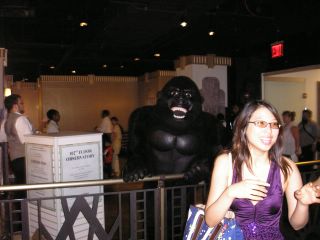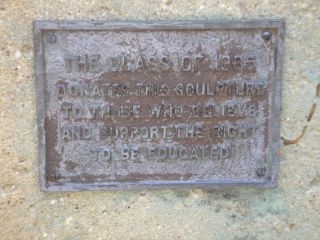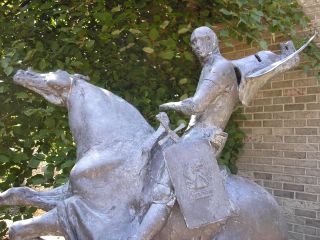I have recently been reading War As I Knew It by General George S. Patton, Jr. It makes for a compelling read given the current military situation in Iraq and Afghanistan. It also serves as an interesting comparison to Catch-22. I am not sure if Heller read War As I Knew It, but Colonel Paul D. Harkins's footnote on page 184-6 so strongly resembles an episode in Catch-22 that I laughed out loud in the airport as I read it. Here it is, in its entirety:
"On or about the fourteenth of December, 1944, General Patton called Chaplain O'Neill, Third Army Chaplain, and myself into his office in Third Headquarters at Nancy. The conversation went something like this:
General Patton: 'Chaplain, I want you to publish a prayer for good weather. I'm tired of these soldiers having to fight mud and floods as well as Germans. See if we can't get God to work on our side.'
Chaplain O'Neill: 'Sir, it's going to take a pretty thick rug for that kind of praying.'
General Patton: 'I don't care if it takes the flying carpet. I want the praying done.'
Chaplain O'Neill: 'Yes, sir. May I say, General, that it usually isn't a customary thing among men of my profession to pray for clear weather to kill fellow men.'
General Patton: 'Chaplain, are you teaching me theology or are you the Chaplain of the Third Army? I want a prayer.'
Chaplain O'Neill: 'Yes, sir.'
Outside, the Chaplain said, 'Whew, that's a tough one! What do you think he wants?'
It was perfectly clear to me. The General wanted a prayer --- he wanted one right now --- and he wanted it published to the Command.
The Army Engineer was called in, and we finally decided that our field topographical company could print the prayer on a small-sized card, making enough copies for distribution to the army.
It being near Christmas, we also decided to ask General Patton to include a Christmas greeting to the troops on the same card with the prayer. The General agreed, wrote a short greeting, and the card was made up, published, and distributed to the troops on the twenty-second of December.
Actually, the prayer was offered in order to bring clear weather for the planned Third Army break-through to the Rhine in the Saarguemines area, then scheduled for December 21.
The Bulge put a crimp in these plans. As it happened, the Third Army had moved north to attack the south flank of the Bulge when the prayer was actually issued.
PRAYER
Almighty and most merciful Father, we humbly beseech Thee, of Thy great goodness, to restrain these immoderate rains with which we have had to contend. Grant us fair weather for Battle. Graciously hearken to us as soldiers who call upon Thee that, armed with Thy power, we may advance from victory to victory, and crush the oppression and wickedness of our enemies, and establish Thy justice among men and nations. Amen.
REVERSE SIDE
To each officer and soldier in the Third United States Army, I wish a Merry Christmas. I have full confidence in your courage, devotion to duty, and skill in battle. We march in our might to complete victory. May God's blessing rest upon each of you on this Christmas Day.
G. S. PATTON, JR.
Lieutenant General
Commanding, Third United States Army
Whether it was the help of the Divine guidance asked for in the prayer or just the normal course of human events, we never knew; at any rate, on the twenty-third, the day after the prayer was issued, the weather cleared and remained perfect for about six days. Enough to allow the Allies to break the backbome of the Von Rundstedt offensive and turn a temporary setback into a crushing defeat for the enemy.
We had moved our advanced Headquarters to Luxembourg at this time to be closer to the battle area. The bulk of the Army Staff, including the Chaplain, was still in nancy. General Patton again called me to his office. He wore a smile from ear to ear. He said, 'God damn! look at the weather. That O'Neill sure did some potent praying. Get him up here. I want to pin a medal on him.'
The Chaplain came up next day. The weather was still clear when we walked into General Patton's office. The General rose, came from behind his desk with hand outstretched and said, 'Chaplain, you're the most popular man in this Headquarters. You sure stand in good with the Lord and soldiers.' The General then pinned a Bronze Star Medal on Chaplain O'Neill.
Everyone offered congratulations and thanks and we got back to the business of killing Germans --- with clear weather for battle. P.D. H."
So there you have it. That screams Catch-22 all over it. Patton's demand for the prayer, the fact the cards weren't issued on time for the planned attack, the very prayer itself, it all is disturbingly comical. I wonder if literary analysis has been done comparing Catch-22 and War As I Knew It. That's something I want to look into, but given that school starts tomorrow, I probably will not have time.
I pray that everyone enjoyed their holidays.













































